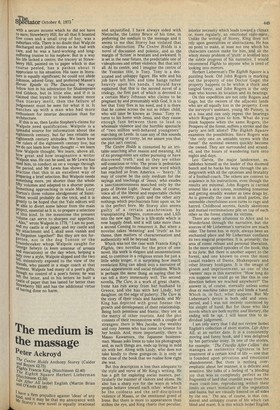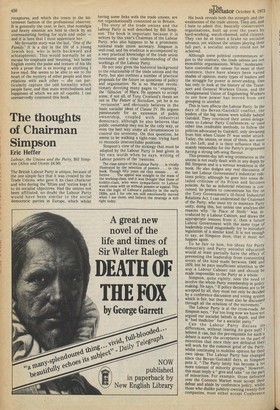The medium is the massage
rheter Ackroyd The Centre Holds Anthony Storey (Calder and Boyars £2.75) p p ,,,i„;ghts Francis King (Hutchinson £2.40) 1.ne Eighth Square Herbert Lieberman ,-lutchinson £2.50) Life After All Isobel English (Martin Brian and O'Keefe £2.00)
!..have a firm prejudice against 'ideas' of any :91d, and it may be that my annoyance with Mr Storey's new novel is equally irrational
and unjustified. I have always sided with Nietzsche, the Lenny Bruce of his time, in preferring the medium to the message and it seems to me that Storey has violated that simple distinction. The Centre Holds is a novel of discussion and polemic, and so the margin of 'fiction is hesitant and awkward. It is set in the near future, the predictable one of videophones and urban violence. But that isn't all. At its centre, and I imagine the centre of the Yeatsian title, is Tony. Tony is a desiccated and unhappy figure. His wife and his job have left him, and time hangs rather heavily upon his hands. I should have explained that this is the second novel of a triology, the first part of which is devoted to a certain Mary Johnson who claims to be pregnant by and presumably with God. It is to her that Tony flies in his need, and it is there that he comes across the not so infant child, who will later be known as 'Jesus.' Tony returns to his home with Jesus, and they cause enough fuss between them to lead to wholesale violence and the horrible spectacle of "two million well-behaved youngsters" marching on Leeds. In case any of this sounds unconvincing or corny, let me assure you that the plot isn't central. The Centre Holds is consumed by an irritable searching after reason and meaning. All of its protagonists are either pursuing or have discovered 'truth,' and so they are either self-conscious or trite. The prose is pedestrian and perfectly embodies that new word which has reached us from Arherica — 'heavy.' It may of course be the only medium for the sayings and teachings of 'Jesus,' who exudes a sanctimoniousness matched only by the guru of Divine Light. 'Jesus' does, of course, voice all of the liberal and respectable cliches about sex, anxiety, guilt and the other airy nothings which psychiatrists foist upon us; he is the perfect bore. Mr Storey also seems guilty of a certain anachronism by transplanting hippies, communes and LSD into the new age. This is a life-style which is now happily dead, and it will take more than a second Coming to resurrect it. But when a novelist takes 'meaning' and 'truth' as his theme, then matters of characterisation and authenticity will be beyond him.
Which was not the case with Francis King's Flights, two novellas for the price of one novel. His work is elegant and unostentatious and, to continue in a religious strain for just a little while longer, it is surprising how much revelation King can admit into a narrative of social appearances and social relations. Which is perhaps the same thing as saying that he can tell a story immensely well. The second novella, The Cure, is a work of great charm. Irene has run away from her husband to Greece, and she has with her Lindy, her daughter, on the edge of puberty. The Cure is the story of tbeir trials and hazards, and Mr King has depicted with great finesse the growth and development of their relationship. Being both penniless and frantic, they are at the mercy of other tourists. And the plot consists of their reconnoitres with a couple of strangers: there is Mrs Jacobs, the wealthy and cosy Jewess who has come to Greece for her health. And, more importantly, there is Masao Kawamura, the Japanese businessman. Masao asks Irene to take his photograph and, as such things are, ends up living in mild sin with her. Along with Lindy, who does not take kindly to these goings-on. It is only at the close of the book that we realise how right she was.
But this description is less than adequate'to the style and verve of Mr King's writing. He has a gift for exploring social nuance, particularly the manner of visitors and aliens. He also has a sharp eye for the ways in which people behave toward each other: whether it be the coldness and the self-disciplined violence of Masao, or the emotional greed of Irene. But there is more to appearances than strikes the eye, and King charts that peculiar,
interior necessity which leads toward a climax or, more regularly, an emotional stale-mate. Unlike the writing of Storey, King does not rely upon generalities or abstractions. He has no point to make, at least not one which his characters cannot make for him, and so the wholy messy problem of 'truth' is levelled into the subtle progress of his narrative. I would recommend Flights to anyone who is tired of looking into mirrors.
Herbert Lieberman's The Eighth Square is a puzzling book. Old John Rogers is marking out the property of one Doctor Gage; the property happens to be within a thick and tangled forest, and John Rogers is the only man who knows its location and its bearings.
On this expedition are not only Rogers and Gage, but the owners of the adjacent lands who are all equally lost in the property. Even the surveyor's assistant, young Mr Putney, is at a loss and can only repeat the bearings whichRogers gives to him. What do you think happens when the same Rogers, the Prospero of the forest, suffers a stroke and the party are left. alone? The Eighth Square examines the possibilities. Since Rogers was "the only one on amiable terms with the forest" the nominal owners quickly become the owned. They are surrounded and stranded, and the hours of wandering turn into nights and days.
Leo Garvix, the major landowner, establishes himself as the leader of this doomed bunch and he hacks his way through the undergrowth with all the optimism and brutality of a football-coach. The others are content to acquiesce in his instructions, even though the results are minimal. John Rogers is carried around like a sick totem, mumbling nonsense and getting steadily weaker as time drags by. As is generally the case in small parties, the ostensible cheerfulness soon turns to rage and hatred. Childhood secrets, family skeletons and mutual recriminations pile on top of each other as the forest claims its victims.
There are many allusions to Alice and to Wonderland through the narrative, but the sources of Mr Lieberman's narrative are much older. The forest has, in myth, always been an enchanted place and Mr Lieberman conflates its two magical properties. It is, primarily, the area of comic release and personal liberation. In the more spirited episodes of the book, this is its forte. But there is another aspect to the forest, and one known to even the most casual readers of Dante, Shakespeare and other literary hooligans. It is the image of gloom and imprisonment, as one of the 'owners' says in this narrative: "How long do you suppose we could go on like this in one ' direction before we reached anywhere?" The answer is, of course, eternally unless some deus ex machina takes pity and lends a hand. Which is, in fact, what happens. But Mr Lieberman's device is both odd and unexpected, and I was not entirely convinced by his sleight of hand. But for those who like novels which are both mythic and literary, the ending will be apt. I will leave this to individual judgement. I am only sorry that I did not review Isobel English's collection of short stories, Life After All, at an earlier date. It is a consistently moving and funny book, and I was delighted by her particular irony. In one of the stories, for example, ' The,Crucifix After Cellini ' she manages an instinctive rightness in her treatment of a certain kind of life — one that is founded upon privation and emotional
' abandonment. But there is nothing overemphatic about her manner, it is delicate and sensitive. She talks of a feeling of "a blinding joy that was as completely perfect as the fragments of land that crumble away from the main coast-line, reproducing within their limits an exact miniature of the vegetation and fauna, but are visually limited on all sides by the sea." The sea, of course, is that consistent and unhappy course of life which can blind and maim. It is this which Isobel English
recaptures, and which she treats in the bittersweet fashion of the professional observer. It is generally the case, in fact, that nostalgia and heavy emotion are held in check by an overmastering feeling for style and order — and it is here that I most appreciate her.
My favourite story was the last, One of the Family.' It is a day in the life of a young Jewish boy, who is both backward and schizophrenic. This would normally be an excuse for emphasis and 'meaning, but Isobel English enters the pulse and texture of his life with a prose that is as moving as anything I have read. She seems to be able to see to the heart of the mystery of other people and their relations with each other — she can particularly capture the odd formality which people have, and that mute wretchedness and happiness of which we are all capable. I can unreservedly commend this book.



































 Previous page
Previous page